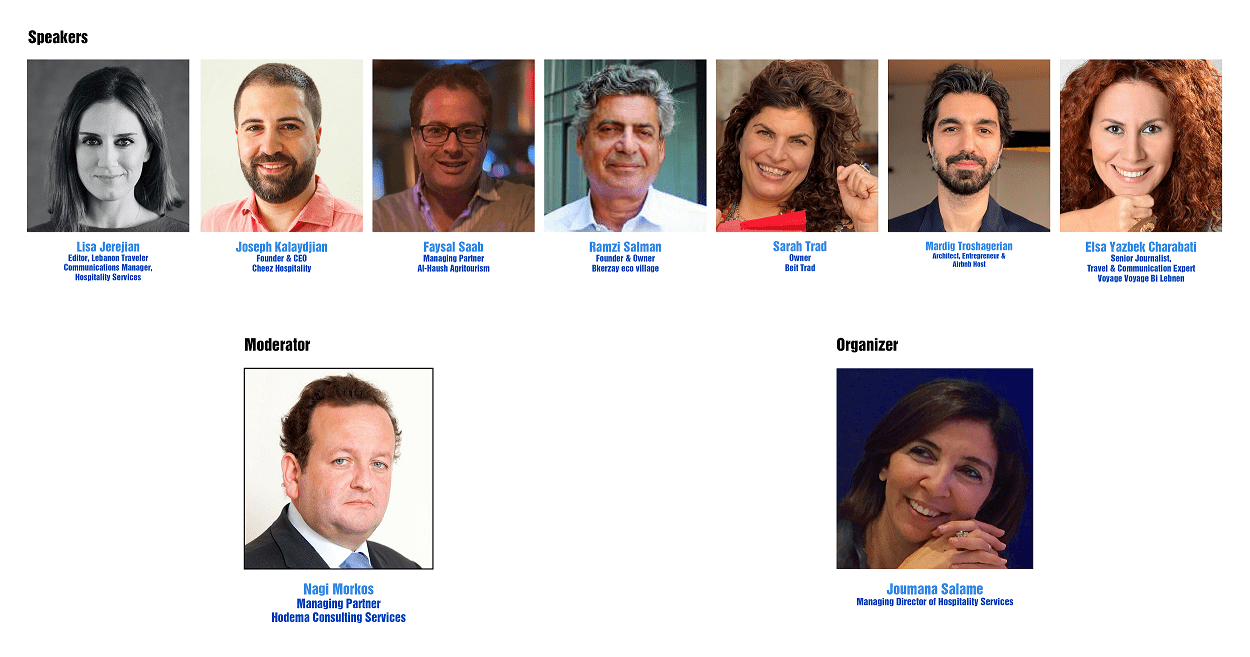Powered by Hospitality News Middle East and funded by the USAID Lebanon Enterprise development (LED) project, Hospitality News Talks held its fifth virtual roundtable on March 11— “Guesthouses and alternative lodging in Lebanon: Smart marketing during an economic crisis.”
The online session, one of 12 such talks moderated by Hodema Consulting Services, invited a panel of industry professionals, including guesthouse owners and communication specialists, to examine how guesthouses and privately run accommodations in Lebanon can promote themselves during dire economic conditions.
The panel included: Lisa Jerejian, editor of Lebanon Traveler and communications manager of Hospitality Services; Joseph Kalaydjian, founder and CEO of Cheez Hospitality; Faysal Saab, managing partner of Al-Haush Agritourism; Ramzi Salman, founder and owner of Bkerzay eco village; Sarah Trad, owner of Beit Trad; Mardig Troshagerian, architect, entrepreneur and Airbnb host; and Elsa Yazbek Charabati, senior journalist, travel and communication expert of Voyage Voyage bi Lebnen. Nagi Morkos, managing partner of Hodema Consulting Services, moderated the session.
Joumana Salame, managing director of Hospitality Services, highlighted the fact that the sector is experiencing growth, especially outside Beirut.
Jerejian gave an overview about alternative lodging in Lebanon, classifying it as anything that that doesn’t fit the standard hotel model, such as B&Bs, rental homes, farmhouses, campsites and glampsites, cabins, aparthotels, hostels, even monasteries and convents. “Guesthouses are usually less than 10 rooms, but in Lebanon, the term is used in a generic sense.”
Concerning location, she emphasized that there has been a big shift in distribution. “Before these properties were mainly concentrated in tourist hubs; now, they are located all over the country due to demand. Staycations and all other sorts of properties are now sought after.”
Jerejian mentioned that Lebanon Traveler magazine focuses on hidden gems in Lebanon through editorial and social media. “People are looking to go and spend the night somewhere unique. We educate people on where to go, where to stay and why to visit. We tell stories about these properties, because storytelling really matters.”
She further added that people are looking for experiential travel and immersive experiences. “The rules of the game have changed; learning about local customs, trying regional food and visiting producers and artisans is what travelers are looking for these days, especially Millennials — who make us a quarter of the world’s population.”
Jerejian advised that guesthouses and alternative lodgings should forge links with Coops, local guides, etc. They need to focus on social responsibility, eco-friendly practices and sustainable behavior. Luxury is wonderful, but authenticity is key.”
She concluded that tourists will return to Lebanon after Covid-19, because they will continue to seek real experiences and Lebanon is abundant in interesting, genuine towns and villages. “Lebanon is now more affordable for foreigners, so this will have a positive knock-on effect for tourism. In parallel, domestic travel will no doubt grow as holidaying abroad becomes more expensive for Lebanese in Lebanon.”
Charabati stated that glamping has become a trendy alternative to guesthouses, and for the past 10 years, she has been highlighting travel destinations across Lebanon through her show Voyage Voyage bi Lebnen.
“Now that travel has become a difficult matter, promoting local tourism through social media and media sponsorships, for example with Lebanon Traveler, is necessary. I encourage my followers to travel using their five senses.”
In her shows, Charabati picks a specific place to spotlight through her videos, and she always includes the local lodging options.
She commented that the Lebanese diaspora is very interested in their homeland; they interact and want to explore unknown places in Lebanon. She is now targeting them through social media as local television stations are too pricey. “Videos that are shared online are well received. We even broadcasted online on Lebanese Diaspora TV.”
Charabati suggested that guesthouses could implement two pricing structures: one for locals and another for foreigners. She said that this would allow the middle class to enjoy them.
Kalaydjian said that Lebanon’s hospitality sector has great potential and many untapped opportunities exist. “Before Covid-19, Lebanon received 2 million foreigner but it has the potential to attract a far great number, especially when one considers the size of the Lebanese diaspora.”
Kalaydjian admitted that the Lebanese Ministry of Tourism needs to do a lot more and bloggers need to help market Lebanon as a tourist destination.
“In the past, Lebanon used to invest USD 6.6 million per year, which equates to USD 1.8 per tourist. However, other countries allocate four times more in order to help boost tourism.”
He proposed to brand Lebanon as a product to specific countries rather than promoting it worldwide. Emphasis should be placed on countries that are interested in Lebanon, such as UK, France, Italy and Germany. Furthermore, it is imperative to communicate with the Lebanese diaspora. To achieve this, Kalaydjian said that funds need to be raised and incentives given to airlines, such as MEA, to get them to offer special rates.
“A collaboration would be beneficial to promote Lebanon. The committee should include people from the tourism board, the Lebanese Ministry of Tourism, the Lebanese government, operators, etc. It needs to be a real joint effort, because this is the only sector with a potential to grow.”
Kalaydjian stated that the future belongs to the guesthouses that are able to develop products, amaze clients, diversify their offerings and target the region/market.
He also added that it is very hard to find talented professionals as many are leaving the country in search of better pay. The staff left behind need training, and this might be an area where guesthouses can collaborate to train staff.
Trad stated that they adjust their strategy at Beit Trad every day. “What started out as a disaster — with Covid-19 and the economic crisis — turned out to be beneficial. With people unable to travel abroad, guesthouses outside Beirut became more popular.”
When it comes to pricing, Trad said that they used to adjust their rates every month depending on the black market, which caused them to switch back to pricing in USD in order to be consistent. As for the LBP rate, she said they decided to make it 2,000 LBP less than the black market rate.
Trad said that her guesthouse attracts Lebanese people looking to explore Lebanon, particularly those looking for high-end escapes, many of whom are still receiving their salaries in USD and now finding the rates more accessible.
In terms of marketing, Trad only uses Instagram; she does not rely on bloggers. However, she believes that rather than each establishment promoting themselves independently, there needs to be an initiative that promotes Lebanon as a whole, targeting mainly the Lebanese diaspora on social media.
Saab said that he opted to price in USD in order to avoid price negotiations and losses. He also added that he gave customers the opportunity to pay in Lolars (bank USD).
“Our clients now are mostly Lebanese who can no longer afford traveling abroad, contrary to previous years when we had a lot of teachers, experts and people from the Gulf.”
When it comes to marketing, Saab said that user-generated content is what Al Haush relies on. “We often post pictures and videos produced by clients. People still want polished videos and pictures, but they also wish to see and hear the experiences of others.” He admitted that word of mouth and the help of some bloggers have helped in terms of marketing.
In 2020, Saab didn’t face any challenges in terms of occupancy. Despite Covid-19 and multiple lockdowns, summer was an extremely busy season.
He added there is a WhatsApp group for guesthouse owners in Lebanon, which was created by Rawi Bazerji (Bouyouti). The group discusses challenges and ideas.
Salman stated that he had to cut labor costs in half to weather the storm and avoid laying off staff. He also said that since April 2020, Bkerzay had a diversified way of payment, which was difficult to manage. Recently, Salman has opted for cash USD because the Lolard has lost its value.
“Whereas before our clients would be from the Gulf, nowadays we have a lot of locals staying with us. We promote Bkerzay through social media, clients’ photos and word of mouth. Customer loyalty is a major component for success.”
Salman said that a guesthouse syndicate could be an interesting idea but would require dedicated people with time to spare.
“We need to build a reserve. It is important to keep people happy to work; employees have been flexible with their salaries, as we have been flexible with them in other areas. We all need to be flexible to sustain.”
Salman believes that contrary to hotels, guesthouses offer something new. “People are fed up with the standardized experiences. Unlike hotels, it is all about passion when it comes to guesthouses,” he added.
Mardig Troshagerian said that the past 18 months have been very difficult, especially since the Beirut port explosion and people wanting to escape the capital.
“I modified my offering to long stays, shifting from tourists to NGOs and people who come from abroad for projects,” he stated. Troshagerian also reimagined his apartments, making sure to include a work station and highlighting the fact that his apartments have a common rooftop and a terrace.
When it comes to prices, Troshagerian offered flexible rates to maintain full reservation. “Thanks to being flexible with rates, I was able to maintain an occupancy rate of 70 percent in 2020.”
Troshagerian said that alternative lodging is the future, so it is important for guesthouses to focus on the small details. People want to experience the cities, towns and villages; they like to see how locals live.
The webinar can be viewed in full here.
The next Hospitality News Talks, “What Lebanon’s municipalities are doing to boost tourism,” will take place on March 18. Click here to register.
To access the full program of Hospitality News Talks webinars, click here.





















